
As responsible bird owners, we have to have knowledge of good nutrition that is constantly evolving. As with all other animals, parrotlets also need a proper balance of proteins, vitamins, minerals, fat, and carbohydrate. But, What to feed parrotlet?
They also need fresh water readily available 24 hours in captivity. As per research, different species of Birds need additional nutrients. Thus, in this article, we will talk about what to feed parrotlet and the best food for parrotlet?
Why Be Concerned About What Parrotlets Eat?
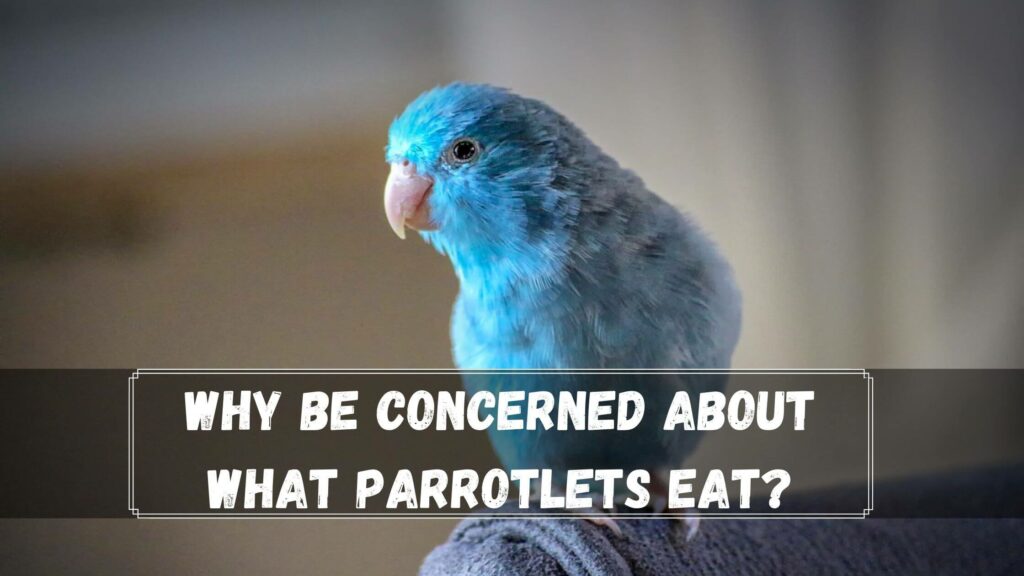
With most birders, nutrition is commonly neglected with parrotlets. It is essential to consult an Avian veterinarian about your parrotlet diet. In many cases, owners often assume they are feeding a proper nutritionally balanced diet to their birds when they are not.
An unhealthy diet tends to be the most common reason for many health problems in parrotlets. It is essential to strive for ways to improve your parrotlet diet continually. To know what to feed parrotlet for longevity, you should focus on constantly educating yourself along with a certain degree of common sense.
It’s not a human thing to provide parrotlet to maintain its life. Being a responsible owner and caring parent, your goal should always be to help them thrive and flourish. Your parrotlet’s life experiences and health depends on how well it is fed.
Also, lack of nutrients and mineral deficiencies causes many health issues in parrotlets, making them suffer from unbearable pain. So, let’s learn what to feed parrotlet without wasting another second.
What To Feed A Parrotlet?
Their diet should be low in fat as parrotlets are vulnerable to obesity. A well-balanced, varied diet must be maintained for parrotlets at all times.
Keeping them on an unhealthy diet will result in iodine deficiency, vitamins deficiency, and other diet-related problems, including egg binding. Therefore, let’s find out the best seed and pellet diet for parrotlets.
Seed
In the wild, parrotlets forage on many seed types when different plants come into season. Many pet owners use commercial seed mixes to prepare their Bird’s diets. Most full seed mixes available over the pet store or online usually contain 4-10 different seeds and nuts.
Most of the commercial seed mixes come with high fat and carbohydrate content, and some also have imbalanced sources of many nutrients. This is why you should never consider keeping parrotlet on seed mixes as the only food source.
Feeding seed mixes only to parrotlet can shorten its life and lead to illness. Hence, beautiful plumage, vibrate song, strong bone condition, and healthy molt is usually achieved by feeding a well-balanced nutritional diet to the BirdBird all of the time. Below are some healthy seeds you can provide to your parrotlet in moderation.
As seed mixers should cover a small portion of a parrotlet diet, it can sometimes be confusing for beginners to know the ideal type and amount of seed to offer their BirdBird. In such cases, we recommend feeding the best seed mix that is overall healthy and tasty to your parrotlets.
Overall Best Seed Mix For Parrotlets
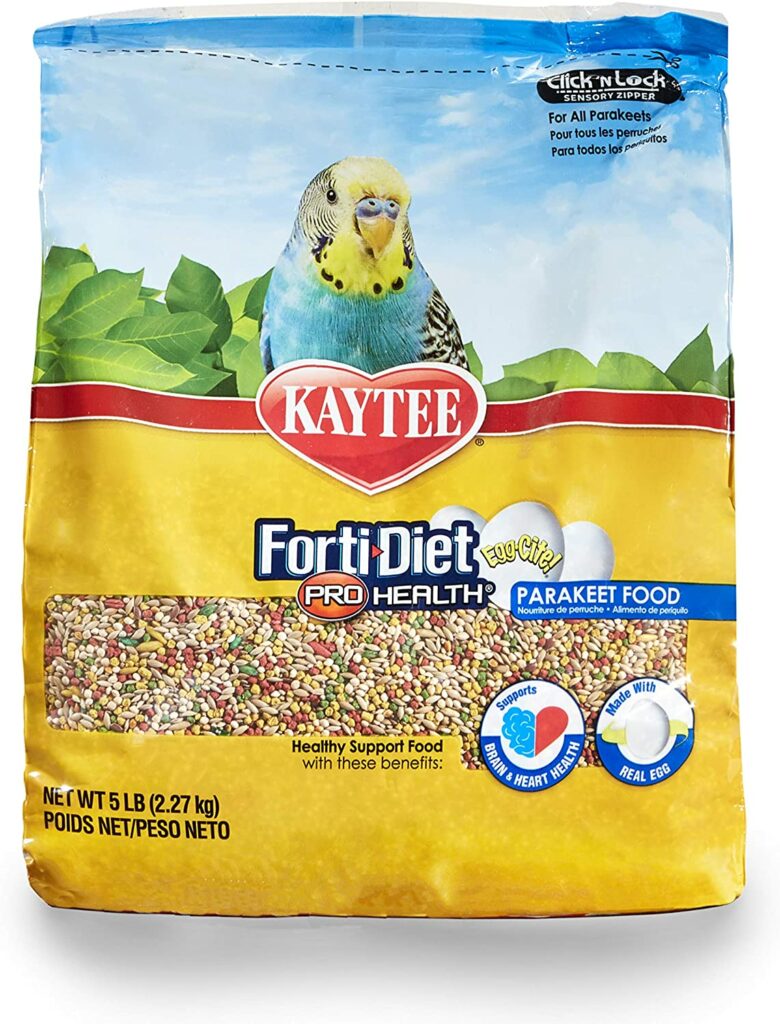
This food is a seed-based blend of fresh ingredients that benefit Bird’sBird’s health. This food has been prepared using sunflower, millet, canary grass seed, and antioxidants. Antioxidants present in this food are selected to boost your parrotlet’s overall health and immune system. It also has omega 3, probiotic, and prebiotic supplements to support your parrotlet brain and heart health.
Also, it overall promotes healthy digestion in birds. Feeding this food, particularly parrotlets, will give them a vibrant plumage. It also tastes good and looks pretty, and it is colorful and textured for a bird to crave. As with any food, it is necessary to avoid overfeeding your parrotlet too much of the seed. One tablespoon of seed is enough for parrotlets to have if mixed with other food varieties.
Pelleted Diets
To raise a well-mannered bird, it is important to wean off seed-eating parrotlets onto a pelleted diet slowly. All commercial pellets available in the market have been developed to meet your parrotlet nutritional needs.
Feeding a pellet diet helps in fulfilling all your Bird’sBird’s dietary needs. Additionally, different formulations of pellet diets are readily available for different parrotlets’ life stages. Some foods are also designed for the management of certain diseases in birds.
Hand-raised parrotlets are the easiest to start on a pelleted diet. They are converting a Matchett parrotlet from a seed-based to a pelleted diet. However, after knowing that the pellets are the ideal diet, you should slowly encourage your source-eating birds onto a pellet diet.
Pellet should always represent approximately 70-75% of a parrotlet diet. There are many good brands of pellet foods available in the market but below is the one that has been tested hundreds of times.
Most pellets come in different shapes, colors, and flavours, enticing birders to buy. It would be best if you only went with purchasing the one that has a good blend of ingredients specially formulated for parrotlets’ health.
Overall Best Pellets For Parrotlet
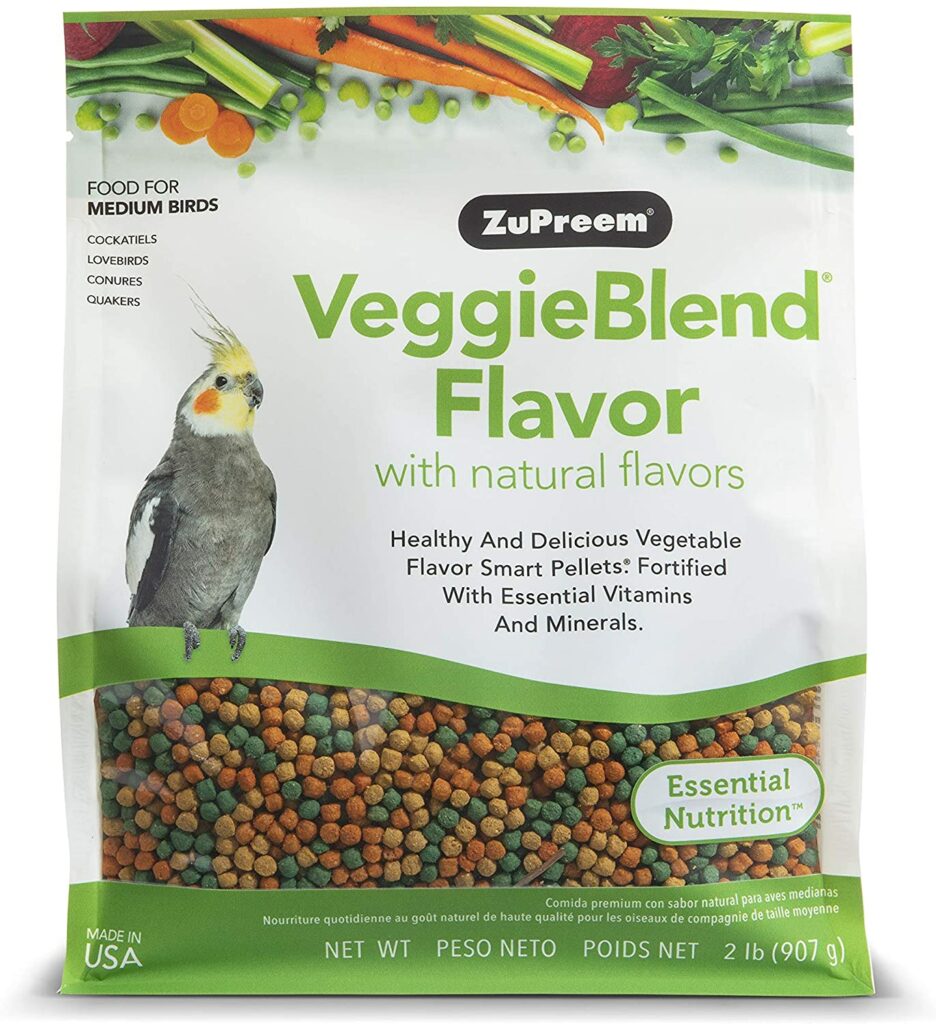
This pellet is the healthiest way to go for parrotlets. This pack comes with a unique blend of ingredients, including soybean meal, ground corn, and veggies like lettuce, watercress, spinach, and dried fruits.
This makes these natural Bird pellets fortified with amino acids, minerals, and vitamins. These pellets are made using the same ingredients found in other popular foods for birds.
How Much Do Parrotlets Eat?
A parrotlet diet should only have one tablespoon of seeds per day per rule of thumb. Therefore, they should be fed a varied diet. Fruit should make up 5% of their overall diet, whereas veggies should be 15-20%. Nuts can be included or excluded depending upon the amount of food you are offering to your parrotlet at a time.
Nuts are best as treats. If you have more than one parrotlet in a cage, consider using more than one shallow dish to serve—separate containers to ensure that the BirdBird has an equal chance to eat. Feeding them more than one parrotlet in one food bowl is not possible.
The amount of food that a parrotlet needs usually depends on their age, activity level, and health. Plus, many owners feed their birds more than two times a day in small quantities. Depending upon your bird preference and how much they eat, consider adjusting.
Look over the dish at the end of the day to determine how much food they eat. If there is too much seed or any particular part of their food left, it means you offered too many.
When feeding seeds with another varied diet, it becomes very confusing for owners to maintain the nutrient balance. This is why it is a must to convert your parrotlet to a pelleted diet, as it gives you more control over the amount of food.
How Do I Convert My Parrotlets To A Pelleted Diet?
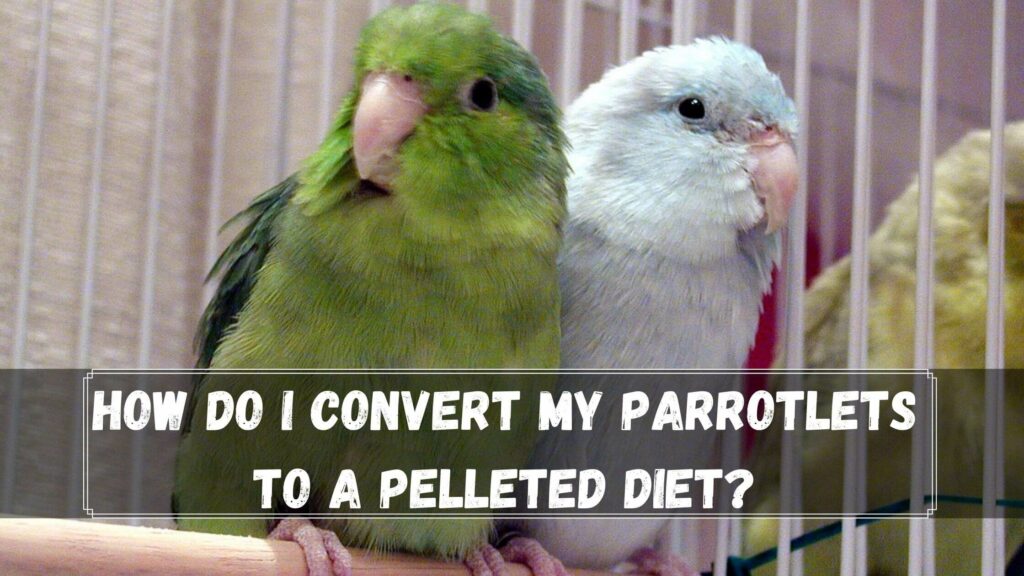
It is straightforward to get baby parrotlet to convert to a pelleted diet. Depending upon your Bird’sBird’s age, the degree of time it will take to convert them to a pellet diet varies. This is why converting seed-eating parrotlets onto a formulated diet is not always easy.
Plus, to seed-eating parrotlets, pellets may not even be identified as food to them. Depending upon the age, weaning off a seed-eating bird to a pellets-based diet can take over 4 to 12 weeks while having pellets always available in a separate dish around them.
To aid the pellets’ acceptance in your parrotlet cage, you can even mix the pellets in a reduced amount of seed. However, your parrotlet is less likely to eat a pellet accidentally. I have seen parrotlets taking days, weeks, and even months to modify their diet.
One should never draw the seeds entirely without being confident that his parrotlet eats pellets, including fruits and vegetables. Even parrotlets are known to be stubborn, and they can be trained to eat pellets. If you encounter any problem with this transition, consider consulting a bird specialist or Avian veterinarian.
The key is to prepare the parrotlets, not the BirdBird. Let’s take a look at the 15 best fruits and vegetables that can be offered to parrotlets in moderation.
| 15 Safe Fruits | 15 Safe Vegetables |
| Apples | Bok choy |
| Apricots | Broccoli stems and florets |
| Bananas | Brussel sprouts |
| Blackberries | Spinach |
| Blueberries | Cabbage |
| Cherries | Carrots |
| Coconut | Sweet Potatoes |
| Grapes | Cucumber |
| Grapefruit | Cauliflower |
| Mandarin Oranges | Chard |
| Oranges | Cress |
| Mango | Fennel |
| Melons | Kohlrabi |
| Peaches | Parsley |
| Pears | Radish |
15 Best Fruits and Vegetables For Parrotlets
Fruits and vegetables should always account for approximately 15 to 25% of a parrotlet’s daily diet. It would help to offer vegetables with high water composition like lettuce, celery, and even iceberg.
Ensure to wash the fruit or the veggie thoroughly to remove any chemicals. Cutting them into manageable pieces depending upon the size of the parrotlet is necessary. You don’t need to peel off every fruit.
If you know what fruits are healthy, you can always correctly feed them while being modern. If your parrotlet appears to develop a particular fancy for one food item, consider reducing its volume.
You can even consider stopping feeding that fancy food item temporarily to force the parrotlets to try other foods. It would help if you considered teaching and treating your parrotlet like a small child.
Consider offering a small variety of fruit or vegetable daily. It’s worth never stop trying. Considering this, here is the list of healthy fruits and vegetables safe to feed parrotlets. To know more details, you can check out our guide on the best fruits and vegetables for parrotlets.
3 Best Parrotlet Foods
Bird Street Bistro Sample Pack Bird Food
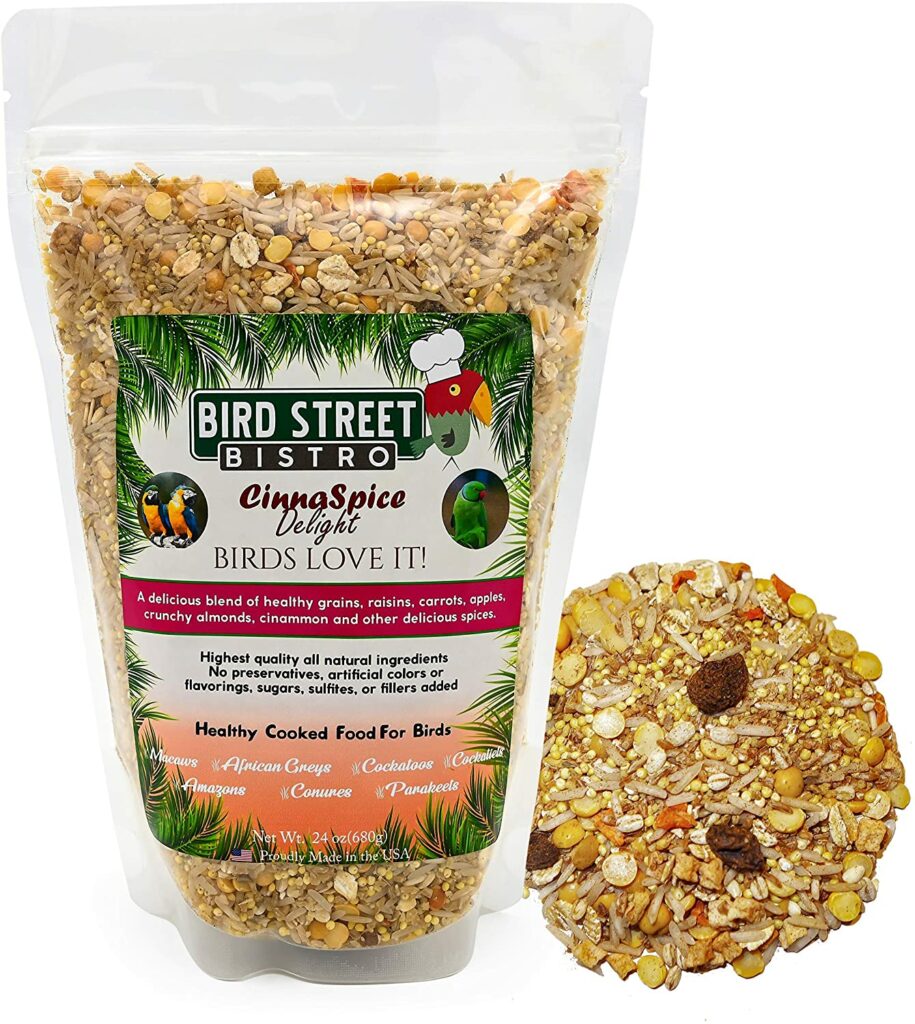
This acts as a sample pack for you to discover what your parrotlet’s favorite flavour is. It comes in many different flavors, but what makes it more trustworthy is made in the USA. Not only does it come with many flavour packs, but it also includes organic fruits, vegetables, and grain. Also, It has a healthy blend of spices.
On top of that, it is free from any preservatives, colors, salt, and sugars. To prepare this food, you need to mix the food with water and heat it for a couple of minutes. This one is the healthiest food to serve to your parrotlet. Make sure to throw out any leftovers after mealtime. After doing this food, refill or rechange the water in their bowl with a fresh one to drink.
Interesting Further Reading
- What Vegetables Are Good For Parakeets? In 2022
- Can Parakeets Eat Guava? 4 Dangers + 3 Safety Tips
- Can Parakeets Eat Eggs? (What About Shells, Yolk & White)
Best Budget: Higgins Safflower Gold
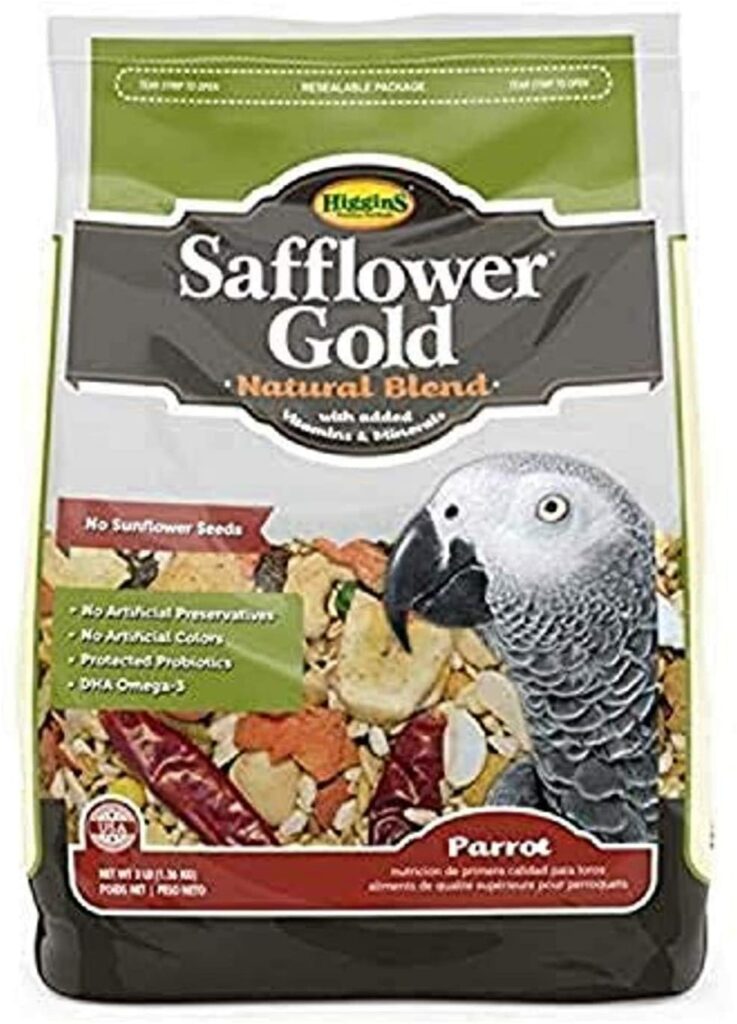
With tons of sunflower seeds, any bird food will keep the parrotlet from eating them exclusively while leaving all the other nutritious ingredients, including additional sources. To avoid this, this brand has particularly formulated a safflower gold variety to solve the issue.
This Higgins Safflower Gold omitted the sunflower seeds altogether. It comes with a healthy blend of safflower seeds, high fiber grains, and millets, and it is also equally rich in fruits and nuts. With this food, your little parrotlets will never go hungry.
It also includes antioxidants and plant-based Omega 3 fatty acids to promote digestion. The other notable thing about this product is it is free from preservatives or any different artificial color.
Best for Babies: Kaytee Exact Hand
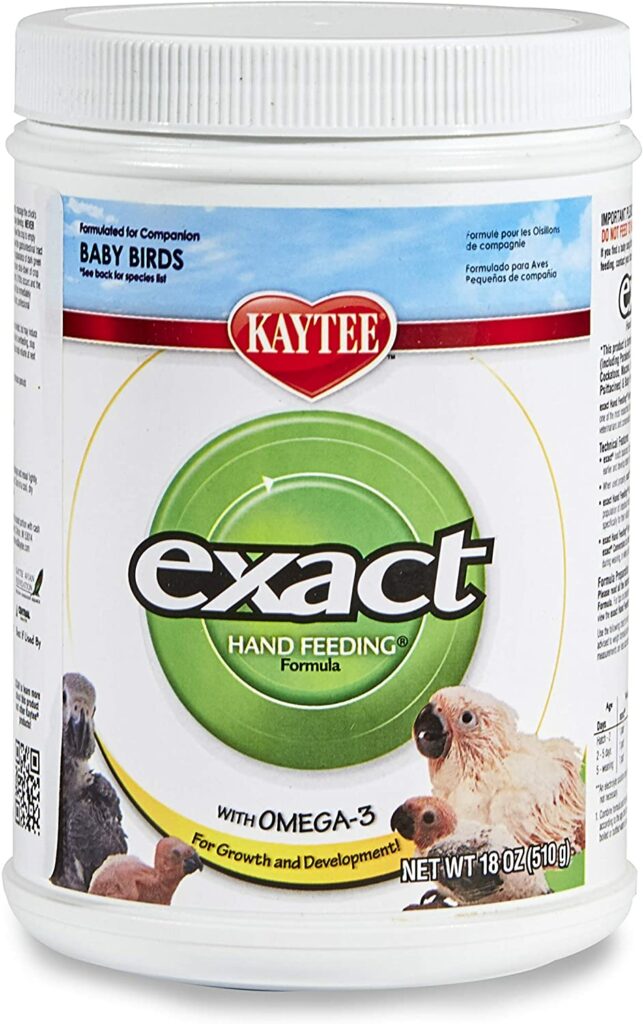
Just like our babies, parrotlet babies also need a specially formulated diet to triple their body weight in the early days. This food is highly nutritious with a high-fat formula to support a healthy weight gain, develop healthy bones, strengthen its beak, and promote healthy brain function.
Omega 3 fatty acids supplement added in this food mainly helps accelerate the heart, brain, and eyes functions of your parrotlet babies. Besides, probiotics and prebiotics infused in this product help baby bird digestion until they have their digestive enzymes.
Preparing this food is relatively easy. Mix it with the warm water and stir it until it turns into a paste. You can feed it using a syringe or spoon to your baby parrotlets. Remember the expiry date as this formula is formulated to stay fresh for up to 45 days after opening.
5 Tips For Feeding Parrotlets
- Even parrotlets drink a few teaspoons of water a day. Freshwater should be available every day. They don’t like drinking water with droppings, food leftovers, or dirty because of anything.
- Parrotlets need a variety of nutrients. Supplement their diet with fruits and vegetables. Only a tiny amount of fresh fruit or vegetables every day will benefit their health.
- Clean their food and water bowls daily to prevent any disease in parrotlets.
- Monitor the amount of food eaten every day by each parrotlet you have.
- Parrotlets should have a varied diet. So offer a variety of fresh foods every day.

Hi, There and Welcome to BirdsNews.com, is here to help you learn and care about pet birds. and this blog is a journal of everything I’ve learned.

